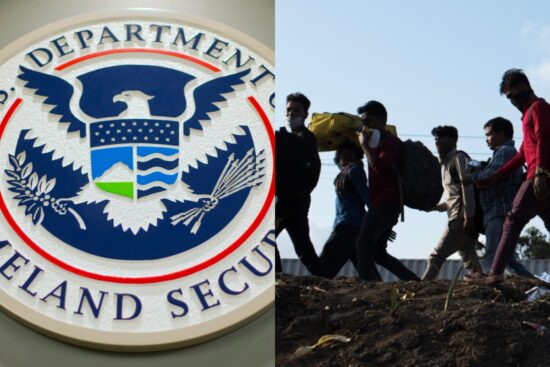Mexico’s announcement following Supreme Court ruling on Texas law SB4
Mexico responds to SB4. The Supreme Court ruled that the controversial new measure can go into effect. What does this mean?
2024-03-21T14:18:10+00:00
- Mexico responds to SB4 in Texas.
- The anti-immigrant law sparks controversy.
- How is it affecting relations between Mexico and Texas?
In a strong statement issued on Tuesday, the Mexican government has made its position clear.
This declaration comes after the recent decision by the United States Supreme Court to allow Texas to move forward on enacting SB4.
The law is supported by Republican Governor Greg Abbott.
Before you continue reading, we invite you to listen to the new Tu Mundo Hoy podcast by clicking HERE.
CLICK ON THE IMAGE TO LISTEN TO THE PODCAST

Mexico responds to SB4

The Mexican government made it clear that it will not accept migrants who are deported under Texas law SB4.
According to The Associated Press, authorities in Mexico will not accept individuals expelled under Texas’ controversial anti-immigrant law.
SB4 grants extraordinary powers to the Texas police.
These powers would be used to detain migrants suspected of illegally crossing the border.
Controversial Texas law affects migrants

Once detained, migrants could be deported without going through the federal system.
They could also be charged with a misdemeanor for entering the country illegally, according to the AP.
Given this situation, the Mexican Ministry of Foreign Affairs has been emphatic in stating that it will not allow repatriations from Texas.
«We will not accept, under any circumstances, repatriations from the state of Texas,» stated the official communication.
What will happen to undocumented migrants in Texas?

The Mexican government’s stance reflects its concern about potential human rights violations that could arise from the implementation of this law.
It also seeks to avoid overburdening resources allocated to the care of vulnerable migrants.
Mexico’s refusal to receive migrants expelled under SB4 could generate additional tensions in the already complex relationship between both countries regarding migration.
For now, the fate of those migrants who are detained and expelled under the terms of this controversial law in Texas remains uncertain.
Mexico responds to SB4 with a warning

Civil rights organizations in Texas issued an urgent warning on Tuesday, urging residents and migrants to familiarize themselves with their rights in light of the controversial law going into effect.
SB4 has sparked significant concern and is being appealed in a federal court.
This comes after the Biden administration and immigrant rights advocates filed a lawsuit arguing its unconstitutionality.
During a press conference, Domingo García, president of the League of United Latin American Citizens (LULAC), the oldest Hispanic organization in the U.S., had advice for immigrants.
Advice for immigrants

García encouraged Texas residents to educate themselves about their rights and to report any abuse related to the enforcement of this law, according to EFE.
Furthermore, he announced that the organization will set up a toll-free hotline in the coming days to provide information to those affected and to receive complaints about potential abuses.
SB4, classified as one of the most drastic anti-immigrant laws in the history of the United States, makes it a misdemeanor to enter or attempt to enter the state irregularly from a foreign nation.
In case of repeat offenses, this offense can escalate to a felony, with penalties of up to 20 years in prison.
 Related post
Related post





